|
|
|
Sort Order |
|
|
|
Items / Page
|
|
|
|
|
|
|
| Srl | Item |
| 1 |
ID:
175154
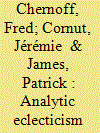

|
|
|
|
|
| Summary/Abstract |
Some scholars in International Relations and comparative politics continue to debate how to obtain the strongest explanatory theory whereas others hold that each approach should be treated as its own area of research. Both of these groups tend to agree that factors from across paradigms cannot be coherently combined with each other. On the contrary, Sil and Katzenstein have argued for analytic eclecticism in scholarship, which would not treat research traditions or paradigms as strict limitations on theory construction. Inspired by pragmatism, they have made a compelling case that considerations of usefulness and knowledge cumulation are more important than paradigmatic fidelity. This forum examines analytic eclecticism from the points of view of neo-empiricism, feminism, and interpretive constructivism, followed by a reply by Sil. A decade has passed since the publication of Sil and Katzenstein’s Beyond Paradigms, so it seems appropriate to reflect upon the strengths and weaknesses of analytic eclecticism.
|
|
|
|
|
|
|
|
|
|
|
|
|
|
|
|
| 2 |
ID:
175158
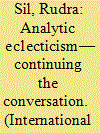

|
|
|
|
|
| Summary/Abstract |
In this response to the contributions in this symposium, I approach the above articles not as wholesale critiques requiring point-by-point rebuttal but as constructive engagements that require clarification or invite further reflection as part of an ongoing conversation. In some instances, I revisit and elaborate upon the main motivations and assumptions that Peter Katzenstein and I had in mind as we sought to lay out the significance of analytic eclecticism for different audiences. At other times, I take it upon myself to consider aspects of our approach that might be updated or reframed in light of concerns raised by some of the authors. I specifically address four issues that have been raised: the core logic of analytic eclecticism and its operationalization with respect to once-dominant paradigms in International Relations; the link between complexity, causality, and constitutive logics; the status of metatheory and the links between eclecticism and pragmatism; and the relationship between scholarly debates and “real-world” issues of policy and ethics. Whether the response is satisfactory or not, it is worth bearing in mind that, for Peter Katzenstein and myself, analytic eclecticism was always meant to be more of an ethos than a method or manifesto; that ethos long predates our published work and is evident in the thoughtful contributions that constitute this symposium.
|
|
|
|
|
|
|
|
|
|
|
|
|
|
|
|
| 3 |
ID:
175149
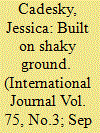

|
|
|
|
|
| Summary/Abstract |
In October 2017, Canada launched its Feminist International Assistance Policy (FIAP). While Canada’s explicit use of the words “feminist” and “feminism” may be refreshing, critical questions on the FIAP’s interpretation and application of these concepts remain. These challenges are not unique to the FIAP. Rather, the central weaknesses of the FIAP can be seen as symptomatic of several endemic challenges that persist in the current policies and practices that seek to promote gender equality in the developing world and beyond. This article presents the theoretical and conceptual lineage that has informed the FIAP, drawing from challenges present within literature on security, gender equality, and gender mainstreaming. Three main shortcomings relevant to both the literature and the FIAP are explored: first, the assumptions and essentialization of “gender” to mean “women”; second, the frequent conflation of “gender equality” with “women’s empowerment”; and last, the paradox of gender, gender equality, and feminism being simultaneously over-politicized and depoliticized to suit prevailing policy environments, with particular implications for the global coronavirus pandemic, as well as impacts in fragile and conflict-affected states. This analysis sheds light on persistent challenges in feminist foreign policymaking and offers insights for the development of Canada’s White Paper on feminist foreign policy.
|
|
|
|
|
|
|
|
|
|
|
|
|
|
|
|
| 4 |
ID:
175148
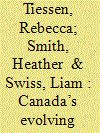

|
|
|
|
|
| Summary/Abstract |
This essay introduces a collection of articles on the lessons that can be drawn from Canada’s Feminist International Assistance Policy (FIAP) as Canada moves toward a more concrete and deliberate approach to feminist foreign policy. The articles in this collection provide insights into the challenges to be addressed, gaps to be filled, and the critical analyses necessary for expanding and enhancing Canada’s feminist foreign policy. The aim of the collection is to show that lessons learned from the FIAP can inform the design of Canada’s next steps in forging a formalized, comprehensive, and coherent feminist foreign policy. This introductory essay summarizes the five articles in this special section of International Journal on the FIAP and Canada’s feminist foreign policy and highlights their key findings.
|
|
|
|
|
|
|
|
|
|
|
|
|
|
|
|
| 5 |
ID:
175153
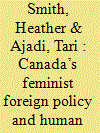

|
|
|
|
|
| Summary/Abstract |
Canadian federal governments regularly try to craft a unique image of Canada in the world; however, the Trudeau government’s embrace of feminist foreign policy feels strikingly similar to the late 1990s when human security was embraced. There seems to be a “sameness” in the promotion of a progressive values-based discourse that has transformative potential for Canadian foreign policy. The question is, does this sense of sameness bear out when we dig into the comparison? Drawing on speeches given by government ministers; policy documents, such as the Feminist International Assistance Policy (FIAP); media; and scholarship, we compare and contrast analyses of the sources of the human security and feminist foreign policy discourses and then identify common critiques. We also examine two significant differences. We find there is consistent Liberal articulation of values-based discourses and policies that have unmet transformative potential. In both cases, style and rhetoric are privileged over transformative change.
|
|
|
|
|
|
|
|
|
|
|
|
|
|
|
|
| 6 |
ID:
175156
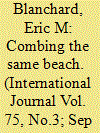

|
|
|
|
|
| Summary/Abstract |
Sil and Katzenstein present analytic eclecticism as a pragmatic, problem-driven, policy-oriented heuristic, posed against the paradigmatism and parsimony inhibiting the study of world politics. I argue that Sil and Katzenstein’s approach is both promising (in that it is one of the more flexible available frameworks to bring separate research traditions into fruitful dialogue) and potentially problematic (if it limits itself to the triad of realism, liberalism, and constructivism). Informed by a recent methodological turn in post-positivist International Relations (IR) and Political Science, this essay takes seriously eclecticism’s commitment to theoretical multilingualism by imagining an eclectic engagement beyond the heuristic’s original purview and calling for eclectic attention to reflexivity, constitutive theorizing, and the dynamics of power and ethics. The article reflects on existing disciplinary power dynamics and disparities and the urgent demand for scholars to more fully contribute to developing effective approaches to real-world threats, such as climate change.
|
|
|
|
|
|
|
|
|
|
|
|
|
|
|
|
| 7 |
ID:
175157
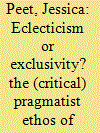

|
|
|
|
|
| Summary/Abstract |
Eclecticism in International Relations (IR) claims to reject the rigid boundaries set by various theoretical traditions, yet, in practice, it falls short of moving the field “beyond paradigms” and tends to produce analytical exclusivity rather than eclecticism. This exclusivity is the result of Sil and Katzenstein’s investment in tenets of American pragmatism. These tenets favor consensus and universalism, leading to the reproduction and exclusivity of the theoretical status quo. Dissolving paradigmatic boundaries requires a more critical form of pragmatism. Drawing on the common origins of feminism and pragmatism paired with the contemporary feminist concept of intersectionality, this essay proposes a critical pragmatist ethos and an intersectional analytic eclecticism. This can produce a more inclusive form of analytic eclecticism and render visible the power dynamics that shape experiences as well as academic scholarship. Only when analytic eclecticism is informed by intersectionality and a critical pragmatism might it actually move IR “beyond paradigms.”
|
|
|
|
|
|
|
|
|
|
|
|
|
|
|
|
| 8 |
ID:
175155
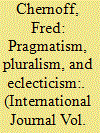

|
|
|
|
|
| Summary/Abstract |
This paper seeks to show ways in which analytic eclecticism can be strengthened to encourage hybrid theorizing capable of yielding more practically useful principles for foreign policy decision-makers. The paper also seeks to show that some of the advantages of analytic eclecticism are overstated, notably the ability to sidestep difficult questions in the philosophy of social science. Nevertheless, with a proper deepening of their discussion of pragmatism, the core of the practical consequences of analytic eclecticism can be advanced with greater force and with a strengthened methodological rationale.
|
|
|
|
|
|
|
|
|
|
|
|
|
|
|
|
| 9 |
ID:
175150
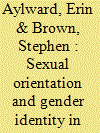

|
|
|
|
|
| Summary/Abstract |
Canada’s Feminist International Assistance Policy (FIAP), launched in June 2017, marks the first time that sexual orientation and gender identity (SOGI) have been mentioned in an overarching Canadian aid policy. The inclusion of SOGI in the policy document sent an important signal to domestic and international development partners on the need to consider these sources of discrimination and marginalization. This article asks two basic research questions. First, what is the place of SOGI in Canada’s “feminist” international assistance? Second, what additional steps does Canada’s development program need to take to protect the rights of lesbian, gay, bisexual, transgender, and intersex (LGBTI) people in the Global South? Based on an analysis of official documents and secondary sources, we argue that FIAP itself sends only a weak signal about the importance of SOGI-related concerns, but Canadian foreign aid has expanded its understanding of LGBTI issues and has begun to commit dedicated resources to addressing them. Nonetheless, the initial programming (2017–2019) was channelled in an ad hoc manner and through one, major stand-alone commitment, rather than through a broader framework that would guide SOGI’s integration into Canadian programs over the long term. If serious about addressing LGBTI rights more systematically, the Canadian government needs to expand its definition of what SOGI entails and move beyond niche programming to recognize the cross-cutting dimension of LGBTI rights in foreign aid, especially in the area of sexual and reproductive health and rights.
|
|
|
|
|
|
|
|
|
|
|
|
|
|
|
|
| 10 |
ID:
175151
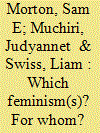

|
|
|
|
|
| Summary/Abstract |
The Government of Canada introduced its new Feminist International Assistance Policy (FIAP) to guide its foreign aid programming in June 2017. This feminist turn mirrors earlier adoptions of feminist aid and foreign policy by Sweden and echoes the current Canadian government’s feminist rhetoric. This paper examines the FIAP and its Action Areas Policies to ask what kind(s) of feminism are reflected in the policy and what groups of people it prioritizes. The paper examines the values, goals, and gaps of the policy in order to understand what feminist values and goals are being operationalized and pursued and what gaps and contradictions exist. By examining the FIAP’s Action Area Policies using a discourse network analysis of the groups represented in the policies, we demonstrate the failings of the FIAP to incorporate an intersectional approach. Our results show that the FIAP adopts a mainstream liberal feminism that excludes many peoples and groups from the core of Canada’s aid efforts.
|
|
|
|
|
|
|
|
|
|
|
|
|
|
|
|
| 11 |
ID:
175152


|
|
|
|
|
| Summary/Abstract |
Canada’s Feminist International Assistance Policy, introduced in 2017, is an ambitious and forward-thinking policy focussed on gender equality and women’s empowerment. The emphasis on a feminist vision, however, raises questions about how feminism is defined and interpreted by Canada’s partners in the Global South. In this article, we examine the interpretations of feminism(s) and a feminist foreign policy from the perspective of NGO staff members in East and Southern Africa. The research involved interviews with 45 Global South partner country NGO staff members in three countries (Kenya, Uganda, and Malawi). We consider the partner organization reflections on Canada’s Feminist International Assistance Policy using a transnational feminist lens. Our findings provide insights into future considerations for Canada’s feminist foreign policy priorities, consultations, and programme design.
|
|
|
|
|
|
|
|
|
|
|
|
|
|
|
|
|
|
|
|
|